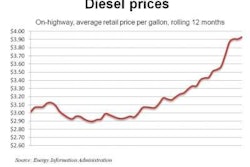Citing its importance as a national environmental, health and budgetary priority, a coalition of 444 organizations this week sent letters to Congressional leaders requesting that funding be restored for the Diesel Emissions Reduction Act. When it was reauthorized in December 2010, DERA’s authorization level had been cut from $200 million annually for five years to $100 million annually for five years, and in February, DERA was eliminated altogether from President Obama’s 2012 budget proposal.
“While we all understand that Congress must make difficult decisions in these tough economic times, the DERA program has proven to be a significant environmental, health and budgetary success throughout the entire United States,” says Allen Schaeffer, executive director of the Diesel Technology Forum, a member of the coalition. “DERA is playing a vital role in a number of clean air projects like cleaning up our children’s school buses and reducing emissions in heavily congested regions. But all these benefits will disappear if funding isn’t restored by Congress this year.”
In their letter to Congress, the coalition stated that DERA was designed to reduce emissions from the 20 million existing diesel engines in use today by as much as 90 percent. “The continued need for DERA has been proven,” stated the letter from the 444 organizations that include environmental, science-based, public health, industry, labor and state and local government groups.
The letters were sent to U.S. Rep. Michael Simpson (R-Idaho), chairman of the Appropriations Subcommittee on Interior and Environment; U.S. Rep. James Moran (D-Va.), ranking member of the Appropriations Subcommittee on Interior and Environment; U.S. Sen. Jack Reed (D-R.I.), chairman of the Appropriations Subcommittee on Interior; and U.S. Sen. Lisa Murkowski (R-Ark.), ranking member of the Appropriations Subcommittee on Interior.
“Since enactment in 2005, DERA has been successful from an economic, environmental and public health perspective,” the coalition stated. “The DERA program has been responsible for the creation and retention of local U.S. jobs that involve manufacturing, installation and servicing of emissions-related technologies. In a FY 2008 Report to Congress, the Environmental Protection Agency estimates that for every dollar spent on the DERA program, an average of more than $20 in health benefits are generated. Every state in the nation now has a diesel retrofit program and benefits from DERA funding. Without additional funding, the DERA program, and its environmental, public health and economic and jobs benefits, will be in jeopardy.”










